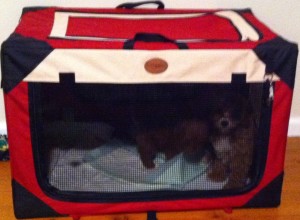 Travel with your pet is uncomfortable, but can be necessary. For example, trips to the local groomer, doggie daycare, dog parks, or a veterinarian can be necessary. Some people even opt to go on holidays with their pet to pet friendly hotels, caravan parks, or campgrounds.
Travel with your pet is uncomfortable, but can be necessary. For example, trips to the local groomer, doggie daycare, dog parks, or a veterinarian can be necessary. Some people even opt to go on holidays with their pet to pet friendly hotels, caravan parks, or campgrounds.
Any sort of travel puts a strain on both you and your pets. That’s why it’s important to plan ahead and have the right equipment to make the trip safe and fun for everyone. Here are a few tips to help make travel with a pet easier.
Pack Properly
Make a list of items you will need to care for your pet on the road and at your destination. This includes a lead and collar, and an ID tag with your contact number on it (even if your pet is microchipped, as some good Samaritans don’t know about microchips, or have concerns taking a lost dog or cat to the local pound). Make sure your microchip details are up to date as well. Bring their usual food, plenty of water, and their bowls as well. Pets usually like routine and familiarity. Bring blankets, waste disposal bags, and fresh litter for cats.
Keep Up On Medical Needs
Make sure your pet is up to date with all their vaccinations and that you have enough supply of any medications he or she is on. Check with your vet or a local vet if there are any local threats at your destination you need to know about, such as paralysis ticks, heartworm, cane toads, poisonous snakes, or other dangers.
If your pet is very anxious in the car or gets car sick, medication may be needed. This can be supplied by your vet, but only after a physical examination. Young animals like puppies and kittens are more prone to motion sickness, and motion sickness can in turn make the pet more anxious about car trips.
Basic Needs
It is a good idea not to feed your pet a large amount of food or water before the trip, as a full stomach may trigger vomiting with motion sickness. Try to avoid erratic and fast driving if possible to reduce nausea. Sometimes, anti-nausea medication is needed before the trip regardless of your driving style. Provide regular stops (pets are like small children) so your pet can stretch their legs, have a drink, and have a toilet break before driving on. Young puppies and kittens will need more frequent feeding, but adult pets can wait until arrival at your destination at the end of the day.
It is important to keep your pet safe during the trip.
Cat Comfort
Cats can easily be restrained in a sturdy cat carrier. Ideally, you should use one that is big enough to put a small litter tray at one end and some bedding such as a towel on the other side. The area should be big enough for the cat to easily stand up and turn around. Water can be given in a bowl inside the carrier during your pit stops.
Make sure the cat carrier is safely restrained by a seat belt. Covering the carrier with a towel can help make your cat feel more secure. You should also try to avoid loud noises (e.g. horns) and erratic driving. Try to position the carrier so that it doesn’t wobble around while driving. Once at your destination, make sure the cat is not able to go outside, and let her explore the new surroundings with access to her carrier (which can be her safe place). Consider talking to your vet about using feliway spray (a feline pheromone that makes the cat feel safer and at home) in the carrier and at your destination.
Dog Comfort
Dogs can also be restrained in a crate, if they are not too big for one. Crates should be large enough for your dog to be able to stand up and turn around, should be sturdy and well ventilated, and should be securely restrained, e.g. by a seatbelt. Get your dog used to the crate well before the trip.
Alternatively, there are special harnesses available for dogs that attach to a seat belt. These provide some freedom, and yet protects the dog and the owners in case of an accident. Barrier screens are an option to secure your dog in an open area, such as the back of a van or in the back of a SUV or station wagon. Make sure to purchase a barrier suitable for your vehicle and strong enough to restrain the weight of your dog in an accident.
If you need any travel tips, help with medication or health concerns, or advice for proper equipment, contact Cronulla Veterinary Clinic anytime.
—
Dr Jackie and her team at Cronulla Veterinary Clinic wish you all a very Merry Christmas, and happy and safe travelling with your furry friends!!
